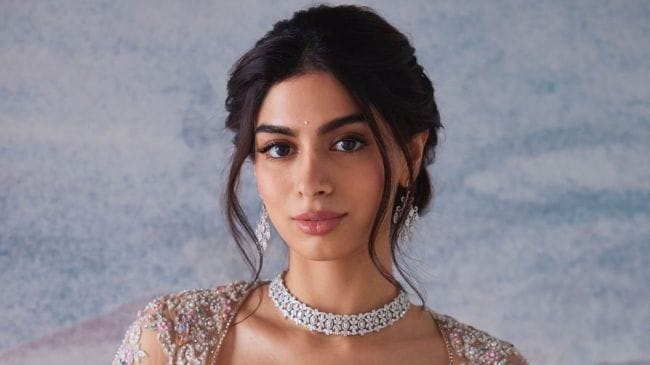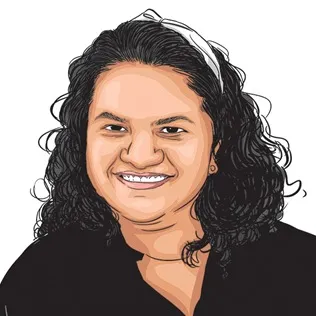Opinion Our idea of ‘perfect beauty’ is the enemy, not Khushi Kapoor
Maybe it’s time to accept that all of us are inflicted with this desire to conform to unrealistic beauty standards, and make it easier to talk about why we want to appear a certain way
 For Khushi Kapoor, and other professionals who have to be visible and attractive in the public eye, getting work done might qualify as a legitimate career investment. (File photo)
For Khushi Kapoor, and other professionals who have to be visible and attractive in the public eye, getting work done might qualify as a legitimate career investment. (File photo) Bollywood actor Khushi Kapoor, daughter of the late actor Sridevi and film producer Boney Kapoor, recently talked about having undergone plastic surgery and the dangers of setting unrealistic beauty standards. Yep, almost in the same breath.
Many have already trolled Kapoor, and I do not want to be in their number. So, if you were looking for an angry, self-righteous echo chamber-y rant on why beauty standards suck and why we shouldn’t aspire to be “beautiful” in the first place, I am sorry to let you down. What I want to do, instead, is take a few steps back and think about why we swing between two extremes in our pop culture discourse these days: We are either normalising “getting work done” or launching into tirades against an “industry that thrives on self-hatred”, as several commentators have called it.
Now, back to the issue at hand. In an interview with a popular YouTube channel last week, Kapoor said: “The issue is when people enhance themselves cosmetically and say that, ‘I woke up like this and I am completely natural’, because then you are setting an unrealistic standard of beauty. It’s unfair to younger girls who look up to you and then they think, ‘Oh, I don’t look like that, why can’t I?’ But, it’s because so much effort has gone into it – you have a team, facials, this and that. There are so many things for skin care that you can do to look a certain way and not everyone knows that.”
Let’s unpack this. Kapoor is right when she says that owning up to cosmetic surgery lowers the expectations of an unrealistic standard of beauty, at least to some extent. However, the fact that so much of our lives are now dominated by visuals (from celebrity vacation photos to influencers’ OOTD reels) that the honesty of owning up is rendered null and void. Why? Simply because the unrealistic standards are there all around us and their effect on us, and our perceptions of how we look, are difficult to get rid of.
Even more difficult is to constantly analyse behaviours and motives of people on social media, famous or otherwise. It was through Kapoor’s interview that I became aware of the procedure of “nano-blading” eyebrows. And I have to admit that even before finding out what exactly it entailed, I wondered if it’s safe enough for me to try. Me, who has scorned all kinds of plastic surgery, and who actually likes how her eyebrows arch! How could I be so weak to even think of such a thing, I wondered. But few are immune to propaganda.
Unlike Kapoor, my appearance has minimal bearing on my career prospects. For her, and other professionals who have to be visible and attractive in the public eye, getting work done might qualify as a legitimate career investment. But for “ordinary” people like me, it’s a sign of, what? Vanity? Insecurity? Or is it simply a sign of the times, where information about and access to these procedures is easily available, and anyone who wants to and can afford to, can look like a “better version” of themselves? Is owning up to your insecurities and “improving your looks” a source of liberation, or a subversion of it? In a world where anyone could technically become the “next big thing” and have their 15 minutes of fame, is it alright to get a nip here and a tuck there? Or is it decidedly anti-feminist? Is wanting to look beautiful really the worst thing you can want?
most read
Those are heavy questions, to which I do not have an answer. I am simply a woman in her late 20s, who has seen plastic surgery get increasingly normalised through the years. It has made me view my favourite celebrities differently, interrogate our ideas of beauty, and made me look at myself in ways that I honestly wish I didn’t have to. Every new viral procedure, every new celebrity confession of getting work done, every time someone around me has said that they want xyz variant of plastic surgery, I have wondered about this widespread desire to not just look beautiful, but perfect. Even as we tell each other how we shouldn’t aspire to look like all the pretty people on our screens, aren’t we all still chasing some perfect ideal that will never, ultimately, be enough?
Maybe the solution is to not deride the idea of beauty. Maybe it’s time to accept that all of us are inflicted with this desire to look “perfect”, and make it easier to talk about why we want to appear a certain way. By swinging between “I want to get a nose job” and “Nose jobs are evil”, we are failing to address the fact that wanting to be “beautiful” is a human desire as old as time, only now it’s much worse thanks to endless content on the Internet. These two extremes also place more emphasis on the individual, rather than the collective, to have healthier ideas of what a human body should look like at different stages of life, and how to achieve realistic standards of beauty — or dismantling them altogether.
arushi.bhaskar@indianexpress.com






